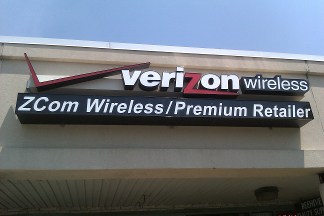Verizon Wireless executives forced independent authorized resellers of the company’s prepaid wireless service to buy cheap phones and activate them with their own money, fraudulently boosting the number of so-called “new activations” Verizon reports to its stockholders.
That is the chief allegation in a new lawsuit filed not against Verizon Wireless itself, but its largest franchisee, ZCom.
The NY Post reports Verizon Wireless executives who managed independent New York Verizon retailers masterminded the alleged scam by suggesting Verizon Wireless’ biggest franchisee, ZCom, “fraudulently increase the number of Verizon Wireless new account activations through the fabrication of fraudulent prepaid accounts,” the suit charges.
ZCom, which sub-leases authorized retail locations for Verizon products, was the defendant in the suit because ZCom can make or break independent store owners who sub-lease, staff, and manage the retail stores.
Plaintiff Shelly Bhumitra, who sub-leased several Suffolk County stores from ZCom, told The Post he was pressured to fraudulently activate pre-paid phones when a Verizon Wireless executive came to his store with ZCom’s owner, Iminder “Vikas” Dhall.
“They suggested that with our own money we should buy inexpensive phones [not smartphones],” and then load them with $30 of prepaid minutes, he said in an interview.
Bhumitra said he was then told to “give them away as bonus phones” to customers so that when used they would count as new activations.
The store owner said he was also instructed to load prepaid minutes onto phones that customers were throwing away and activate them with fictitious names. He was told to keep them in a drawer and make calls on them once or twice a month, echoing charges in the suit.
A store owner would ultimately earn $55 from each activation — enough to more than make up for the $30 outlay.
 The three Verizon Wireless executives outed for allegedly taking part in the scheme have all recently resigned, according to the lawsuit.
The three Verizon Wireless executives outed for allegedly taking part in the scheme have all recently resigned, according to the lawsuit.
Verizon itself is taking several measures to distance itself from the case. Not being named as a defendant has allowed the company to avoid commenting, claiming it would be “inappropriate.” The company also canceled its contract with ZCom, which generates $150 million in revenue for Big Red every year and holds the “master lease” to 130 Verizon Wireless stores, which are all over downstate New York. For now, those store locations will remain open.
ZCom’s lawyer denied the allegations in the lawsuit.
Quarterly financial reports can make all the difference for shareholders who can make or break a stock based on financial results. Verizon Wireless has had an increasingly challenging time managing to grow its prepaid division, which industry observers say used to charge more than its competitors for no-contract plans. By inflating the number of new activations in company results, shareholder value is artificially protected. Store owners can be convinced to play along because of lucrative new customer signing commissions, and to meet required sales targets. Poorly performing store manager/owners can find their leases terminated and, in a worst-case scenario, the store location itself can be closed.
Bhumitra claims he was intimidated into going along with the alleged scam.
Verizon Wireless has tried to compete more aggressively in the prepaid category in 2011, with some success. After creating new monthly packages bundling voice minutes with data and texting at lower pricing, the company added 879,000 new prepaid customers in the first quarter, and 1.3 million in the second, the Post reports.


 Subscribe
Subscribe
